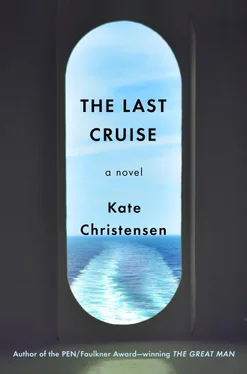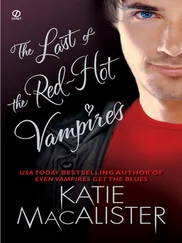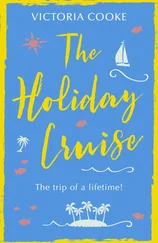Now he had to be away from her for two more weeks. That wasn’t so long, in the scheme of things. But as he pocketed his phone, he had a sad feeling that this was it, it was over, it had to be. He couldn’t subject himself to this constant heartache anymore. It wasn’t worth it, no matter how much he loved Suzanne.
It was getting late. He had just enough time to locate his quarters. Down in his assigned windowless closet-sized cabin belowdecks, his roommate’s bags were on the floor by the bunks, and the top bunk had been claimed by a toiletry bag and a jacket, but the guy wasn’t there, to Mick’s relief. In solitude, he stowed his things, took a quick shower, shaved his stubbled face, and then it was time to get to work.
The buffet galley was already going full tilt when he came in: kids were breaking down ingredients, prepping vegetables, roasting bones for stock, assembling the components of that night’s featured buffet entrées. One kid was stacking oysters in ice at a stainless steel worktable; the guy next to him pulled meat from steaming-hot lobsters. The galley already smelled like a flesh carnival, a stink of sweat and brine and steam and meat. Mick inhaled the familiar smell: he loved it.
He looked around for the girl with the orange neckerchief, the one who’d been late to the meeting. She was peeling mushrooms at her station.
“Your name?” he said as he approached her.
“Consuelo,” she answered. “Yes, I was late, Chef.”
Their eyes met, locked, and for an instant there was a flash of something in her eyes, an insolent familiarity, as if she thought she knew him and therefore didn’t fear him. Her orange neckerchief meant that she was only one rung below him. She had evidently read him closely while he’d spoken in the meeting, the way he’d been reading Laurens. He hadn’t forgotten her correction of “fencepost drug.” He wished he’d said that on purpose to find out whether anyone would be cheeky enough to speak up. Well, he had her number too: she was an arrogant little shit.
He kept his face still. “Once more and you’re gone,” he said.
“Yes, Chef,” she said. She was not at all apologetic, as if she were angry at the circumstances that had made her late instead of being sorry for being late or taking responsibility for her fuckup. Granted, it had only been a minute, and he’d been on her side, but this attitude was a bad sign. He waited, silent. “It won’t happen again,” she said.
The Aquarium of the Pacific was exemplary: bright, modern, well organized. Christine paid the hefty entrance fee and wandered into the lobby, clutching a brochure, bedazzled by the soaring wall of fish swimming through plants and sunlight in the great hall. It was still early, and the place had just opened, but it was already overrun with screaming children in school groups or attached to parents.
Most of the exhibits were small, individually curated aquariums filled with bright patterned fish darting through lavishly weird neon coral, undulating jellyfish, and otherworldly plants. Next to each tank was a placard describing each species’ level of endangerment, its fragile ecosystem, the degree to which its particular habitat and population were currently being damaged by the greed and carelessness of humanity. It was like walking through a museum of ancient jewelry in bright boxes, Christine thought, everything there to be looked at and admired, but never to be worn again. From a distance, it looked as if the tanks were filled with glittery confetti, blown sideways with undulating streamers of algae in the gusts of current from the filters. But up close, the fish were bright scraps of pure life, lurid nuggets of color with faces whose expressions were as idiosyncratic and quizzical as Christine’s own.
She stood staring at one large, calm yellow-and-brown fish, its big eyes looking back at her. She wondered what the fish thought of its life imprisoned in a glass box, whether it longed for the open ocean, whether it had ever known the wilderness. She decided it had probably been born in the aquarium. Maybe it had no idea what it was missing, or, conversely, how lucky it was to be safe in here instead of exposed to predators and the elements out there.
Dodging two hip-high, screaming human boys who went barreling by her, Christine headed to the window of a large sunlit tank where seals and sea lions swam around and around, either in a catatonic state of bored desperation or a blissed-out transcendent trance, it was hard to tell. The boys had already pressed their faces against the glass as their father took shots of the seals swimming by, eyes closed, stomachs up, long and sleek. Their bewhiskered faces were beatifically cynical, like Renaissance paintings of saints’ heads. They appeared to be entirely unaware of the people on the other side of the glass, but Christine caught one peeking back at a little boy, who squealed with excitement.
“He winked at me,” he yelled to his mother, who was two feet away from him. “He winked at me! Mom!”
“That is so cool !” his mother shouted back at him, looking around as if to make sure everyone in the hall was hearing this conversation.
“He didn’t wink at me, ” his brother shrieked at them both.
Christine walked down a dark corridor and out into the sunshine of the aquarium’s big courtyard, where there were more exhibits, colorful little tropical birds called lorikeets bustling around an enormous cage full of bamboo and trees, many kinds of sharks crammed together into a big shallow lagoon, and other, smaller tiled pools full of rays, like a sort of aquatic petting zoo. Children reached their hands in and tapped and rubbed the rays, who didn’t seem to mind.
She bought two small cups of sugar water at a little stand and went through the escape-proof doors into the lorikeet “forest,” a big, netted aviary with dozens of little birds, each colored in sections like a flower or ornamental jewel, bright blue, red-orange, and green, with red-orange eyes and a curved beak. Three lorikeets at once flew aggressively at her. One flapped into her hair and clawed at her head for purchase, another landed with a thud on her shoulder, and two more perched on her arm and wrist. They were heavier than they looked and felt like thrumming balls of energy and kinetic life. She had to hold her arms out like a crucifix as more came at her, diving into the little paper cups and jostling with their beaks to gulp down the precious sugar water. As soon as the cups were empty, the pretty, voracious, powerful little lorikeets flew away as quickly as they had come, leaving scratch marks and droppings behind on her shoulders and arms.
Little fuckers, she thought, half laughing, half relieved to slip through the escape-proof doors at other end of the cage. As she washed her hands at the sink outside, she thought that these birds were like human kids: shitting, hyperactive, sugar-addicted monsters. She wandered over to the pool filled with circling, listless sharks, and made her way up a concrete ramp to a penguin habitat. She had always loved penguins, those most improbable of creatures, dignified, mournful, physically compelling, the Buster Keatons of the animal kingdom. Some of them were falling off the ledge into the water and arcing through the depths; others seemed to be involved in a formally intricate spring mating dance on the ledge. They looked happy enough in their artificial cage, with no predators, no stress, all the food they wanted. But as with all the other aquatic animals, the wall next to their exhibit held a placard about endangerment and extinction and global climate change, and how, in the wild, their species was threatened and struggling to survive.
Depressed, Christine left the penguins and walked on an upward, curving ramp past a shorebird sanctuary filled with egrets, ducks, and plover. Back inside the building, she found herself in a long dim hallway studded intermittently with more bright, glass-fronted boxes filled with doomed sea life receding into the darkness. It was the seafloor section of the aquarium. It looked almost like a haunted house, or a house of mirrors, with a dark, magical, unreal gloom, a relief after the starkly sunlit reminder of the planet’s impending doom.
Читать дальше












